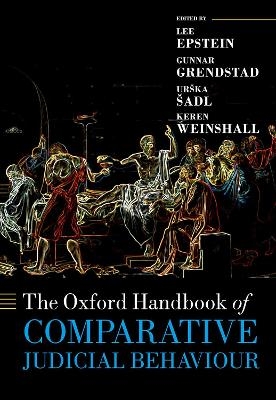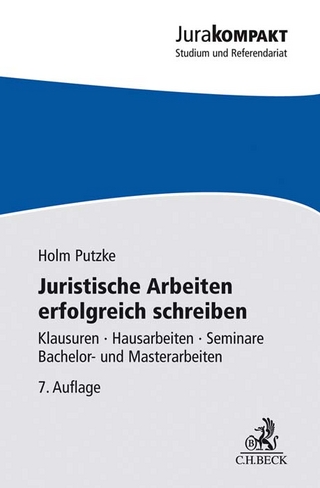
The Oxford Handbook of Comparative Judicial Behaviour
Oxford University Press (Verlag)
978-0-19-289857-9 (ISBN)
These are momentous times for the comparative analysis of judicial behaviour. Once the sole province of U.S. scholars—and mostly political scientists at that—now, researchers throughout the world, drawing on history, economics, law, and psychology, are illuminating how and why judges make the choices they do and what effect those choices have on society.
Bringing together leading scholars in the field, The Oxford Handbook of Comparative Judicial Behaviour consists of ten sections, each devoted to important subfields: fundamentals—providing overviews designed to identify common trends in courts worldwide; approaches to judging; data, methods, and technologies; staffing the courts; advocacy, litigation, and appellate review; opinions; relations within, between, and among courts; judicial independence; court and society; and frontiers of comparative judicial behaviour—dedicated to expanding on opportunities for advancement.
Rather than focusing on particular courts, countries, or regions, the organization of the individual chapters is topical. Each chapter explores an important topic-critically evaluating the state of that topic and identifying opportunities for future work. While the forty-two chapters share a common interest in explaining the causes and effects of judicial choices, the range of approaches to comparative research is wide, inclusive, and interdisciplinary, from contrasts and similarities to sophisticated research agendas reflecting the emerging field of judicial behaviour around the world.
Lee Epstein is University Professor of Law & Political Science and the Hilliard Distinguished Professor of Law at University of Southern California, and a Distinguished Visiting Professor at Hebrew University and at Washington University in St. Louis. Gunnar Grendstad is Professor of Political Science at Department of Comparative Politics at the University of Bergen and principal investigator of Doranoh, a relational database of judicial behaviour on the Norwegian Supreme Court. Urška %Sadl is part-time Professor of Law at the European University Institute. She is principal investigator of Judging Under the Influence: A Critical Assessment of the Role of Legal Actors on the Jurisprudence of the European Court of Justice. Keren Weinshall is Professor of Law and the Edward S. Silver Chair in Civil Procedure at Hebrew University. Weinshall served as Founding Director of the Israeli Courts Research Division and represented Israel at the European Commission for the Efficiency of Justice in the Council of Europe.
1 - Fundamentals
1: Lee Epstein, Gunnar Grendstad, Ur%ska %Sadl, and Keren Weinshall: Introduction to the Study of Comparative Judicial Behaviour
2: Nuno Garoupa: Legal Traditions and Their Relation to Judicial Behavior
3: Tom Ginsburg and Mila Versteeg: Models of Constitutional Review
4: Ran Hirschl: The Global Expansion of Judicial Power
5: Daniel Naurin and Erik Voeten: Transcending the Domestic-International Divide
2 -Approaches to Judging
6: Alexander Morell: Legalism and Professional Norms
7: Rorie Spill and Eric Waltenburg: Attitudinal Judging: Partisanship and Ideology
8: Santiago Basabe-Serrano, Lee Epstein, and Keren Weinshall: Backgrounds, Attributes, and Identities
9: Shai Dothan: Strategic Analysis
10: Lee Epstein and Jack Knight: How Personal Motivations Affect Judges' Decisions
11: Eileen Braman: Research on Cognitive Shortcomings in Comparative Judicial Behavior
3 - Data, Methods, and Technologies
12: Benjamin Engst and Thomas Gschwend: Observational Databases
13: Christoph Engel: Experiments
14: Wolfgang Alschner: Network Analysis for the Comparative Study of Judicial Behavior
15: Michael A. Livermore and Bao Kham Chau: Studying Judicial Behavior with Text Analysis
16: Lee Epstein, Andrew D. Martin, and Kevin Quinn: Measuring Political Preferences
4 - Staffing the Courts
17: Lydia Brashear Tiede: Selecting Judges
18: Michael Nelson and Michael Burnham: Judicial Elections and Judicial Behavior
19: Aníbal Pérez-Liñán and Andrea Castagnola: Judicial Tenure and Retirements
20: Anne Sanders: Law Clerks
5 - Advocacy, Litigation, and Appellate Review
21: Yun-chien Chang and Ching-Fang Hsu: Lawyering in the Private Sector
22: Tommaso Pavone: Agendas, Decisions, and Autonomy: How Government Lawyers Shape Judicial Behavior
23: Ivar A. Hartmann and Diego Werneck Arguelhes: Agenda Setting
24: Jay Krehbiel: The Form and Function of Oral Arguments in High Courts
6 - Opinions
25: Katalin Kelemen: Dissents and Other Separate Opinions
26: Jens Frankenreiter: Studying Judicial Citations and Citation Data
27: Elliot Ash: Language Choices
7 - Relations Within, Between, and Among Courts
28: Henrik Litleré Bentsen and Jon Kåre Skiple: Leadership in Courts
29: Cynthia L. Ostberg and Matthew E. Wetstein: Panel Effects on Courts Around the World
30: Benjamin Bricker, Matthew J. Gabel, and Clifford J. Carrubba: Referrals
31: Björn Dressel: Judge Networks
32: Ori Aronson: Hierarchies of Justice
8 - Judicial Independence
33: Alex Schwartz: Threats to Judicial Independence
34: Brad Epperly: Developing Judicial Independence
35: Frans van Dijk: Conceptualizing and Measuring Judicial Independence
9 - Courts and Society
36: Russell Smyth: Public Opinion and Legitimacy
37: Elin Skaar: Courts and Transitional Justice
38: Courtney Hillbrecht: Compliance with Judicial Decisions
39: Gerald Rosenberg: Courts as Agents of Change
10 - On the Frontiers of Comparative Judicial Behavior
40: Kevin L. Cope: The Conceptual Challenge to Measuring Ideology
41: Jeff Staton: Research Communities and the Collective Investment in Data Infrastructure
42: Anthony Niblett: Artificial Intelligence and Judging
| Erscheinungsdatum | 02.11.2024 |
|---|---|
| Verlagsort | Oxford |
| Sprache | englisch |
| Maße | 176 x 250 mm |
| Gewicht | 2142 g |
| Themenwelt | Recht / Steuern ► Allgemeines / Lexika |
| Recht / Steuern ► EU / Internationales Recht | |
| ISBN-10 | 0-19-289857-4 / 0192898574 |
| ISBN-13 | 978-0-19-289857-9 / 9780192898579 |
| Zustand | Neuware |
| Informationen gemäß Produktsicherheitsverordnung (GPSR) | |
| Haben Sie eine Frage zum Produkt? |
aus dem Bereich


